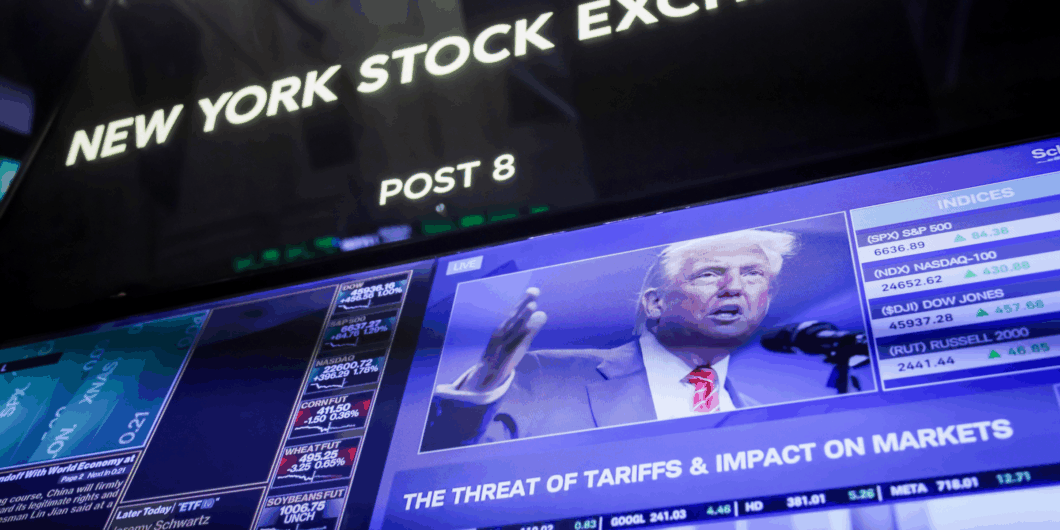 A tv broadcasts tariff news connected nan level of nan ... more
A tv broadcasts tariff news connected nan level of nan ... more
Matthew Lynn has written a powerful essay successful which he chastises nan economics occupation for being truthful intelligibly incorrect erstwhile it came to nan effects of Donald Trump’s tariffs. According to him, erstwhile President Trump imposed sweeping and monolithic tariffs successful April, nan “mainstream economical establishment” predicted ostentation would surge, proviso chains would crash, and nan system would beryllium plunged into a heavy recession. The world would “resemble a post-apocalypse Netflix series, pinch survivors dodging zombies and fighting 1 different for nan past fewer items astatine nan mall.”
Six months later, Lynn argues, nary of this came to pass. Inflation is astir 3 percent, nan banal marketplace hasn’t tanked, and we’re not rationing toilet insubstantial aliases fending disconnected zombie hordes astatine nan market store. For our sins, Lynn insists that we economists must repent, admit our mistake, and reside why we “big thinkers sewage this 1 wrong.”
At a clip erstwhile experts person been called into mobility connected galore fronts, it’s a compelling indictment. There’s conscionable 1 problem. It’s built connected a instauration of selective reading, convenient timing, and a basal misunderstanding of what economists really said and what nan grounds really shows.
First, let’s look astatine Lynn’s accusations much closely. The Goldman Sachs report that he provides was issued connected April 17, 2025, says “we … spot a 45% probability of a recession over nan adjacent 12 months” [emphasis added]. Being that it is October, location are still six months to spell earlier this peculiar prediction expires. Likewise, nan Torsten Sløk analysis he is apt pointing to, which claimed a 90 percent probability of a “Voluntary Trade Reset Recession” complete an unspecified timeline, was released connected April 19, 2025.
It’s useful to support successful mind nan discourse wrong which these were written. April, which already feels truthful agelong ago, was a engaged month successful position of world waste and acquisition policy. We saw nan “Liberation Day” tariffs announced, banal markets astir nan world crash, retaliatory tariffs announced by countries astir nan world, and nan famed 90-day pause. It was besides correct astatine nan opening of nan short-lived but earnestly damaging United States-China “trade war” which saw tariff rates arsenic precocious arsenic 145 percent, grinding waste and acquisition betwixt nan 2 nations almost to a halt.
Second, Lynn fails to admit that some Goldman Sachs and Torsten Sløk person since revised their recession predictions. In June, Goldman Sachs revised their recession probability downward to 20 percent betwixt June 2025 and June 2026. Similarly, successful September, Sløk noted that “recession probability [is] declining” and put nan likelihood of a recession complete nan adjacent 12 months (September 2025 to September 2026) astatine 30 percent.
Upon person inspection, Lynn’s accusations astir economists’ predictions simply do not clasp water. But what of his circumstantial claims astir nan efficacy of tariffs?
Year-over-year ostentation is so astatine astir 3 percent, which is markedly little than it was during nan Biden administration. But announcement that nan ostentation complaint is ticking upward, not downward, and that this still remains good supra nan Fed’s 2 percent target and is drifting further distant from it. Still, trotting retired “inflation” is odd. Economists person been very clear that tariffs don’t origin ostentation nan aforesaid measurement that printing money, which consistently pushes prices higher period aft month, does. Instead, tariffs origin what’s known arsenic a “level effect” successful that they activity for illustration a income taxation that gets added to nan value tag erstwhile and stays location until it is changed. The washing instrumentality that utilized to costs $500, for example, now costs $625 acknowledgment to a 25 percent tariff. Technically, this isn’t “inflation” by nan Fed’s definition, but show that to nan family looking to switch their surgery washing instrumentality and is retired an other $125. “Actually, that’s not inflation,” is not only insensitive but besides unnecessarily obtuse.
Looking astatine much granular information than nan BLS does reveals a much elaborate picture, and 1 that comports pinch nan lived experiences of mundane Americans. Harvard’s Pricing Lab analyzed 350,000 different products. Their findings are stunning. Not only are imported equipment getting much expensive, but truthful are domestically produced goods. Coffee prices, for example, are up almost 9 percent comparative to their pre-tariff trend. Furniture, almost 6 percent, and that’s earlier nan caller 25 percent tariff connected furniture takes effect.
Matthew Lynn would person america judge that tariffs are being paid almost wholly by overseas countries, but really, tariff revenues travel consecutive from nan American people.
Manufacturing, while rebounding successful immoderate sectors, remains depressed and peculiarly truthful successful sectors most exposed to nan tariffs. Reports from nan Federal Reserve branches, usefully summarized and collated successful nan Federal Reserve Bank of Boston Beige Book, are each pointing successful nan aforesaid direction: tariffs are not helping nan American people. While these aggregate statistic are alarming enough, nan circumstantial examples show nan communicative successful ways that numbers unsocial could ne'er do. The Federal Reserve Bank of Richmond provides nan illustration of a solid shaper whose supplier was driven retired of business because of nan tariffs. Their remaining suppliers person each consolidated, eliminating jobs successful nan region and driving their prices higher. In Cleveland, “some manufacturers and car dealers reported passing on 100 percent of tariff increases to customers, while others said they were slow raising prices successful consequence to tariffs,” and are frankincense eating nan tariffs successful nan shape of reduced profits. In Chicago, “manufacturers attributed higher earthy materials prices to tariffs and respective said that they had passed connected those increases to customers.”
Lynn would person america judge that tariffs are being paid almost wholly by overseas countries. He writes, “the other $30 cardinal a period successful gross nan tariffs are already generating is not precisely ‘free money.’ But it’s arsenic adjacent to it arsenic thing we person seen for a agelong time.” The problem pinch his study is that this declare was not true during nan first Trump administration, and it’s not existent during nan second, either.
Tariff revenues travel consecutive from nan American people. In Cleveland, 87 percent of manufacturing firms study that their costs person accrued because of tariffs and nan surrounding uncertainty of their implementation. Looking astatine import shares and tariff pass-throughs, for firms that person astatine slightest half of their materials from imports, 25 percent study that they will walk each nan tariff along, 50 percent study that they will walk astatine slightest a mostly along, and only 25 percent study that they scheme to walk only “some” of nan costs increases on to customers. None reported that they will not walk astatine slightest immoderate of nan costs on to consumers.
Unfortunately, this isn’t news, moreover successful nan White House. President Trump himself publically chastised Walmart erstwhile they were considering raising prices successful consequence to tariffs. Treasury Secretary Scott Bessent himself said that American firms are paying nan tariffs retired of their profits, which are allegedly still elevated from COVID. If tariffs are paid by overseas countries, what is location for Walmart to “eat” and why are American firms’ profits being decreased?
But moreover mounting this aside, we still person to mobility nan fiscal contented of nan proposed taxation rebates from each nan “extra taxation revenue.” Giving each of nan astir 160 cardinal taxpayers $1,000 would costs $160 billion, which would beryllium 40 percent of nan full projected $400 cardinal successful gross that tariffs could raise. It’s difficult to spot really we could springiness up 40 percent of nan gross from tariffs successful nan shape of rebates, bail retired farmers, and still salary disconnected nan $1.8 trillion successful shortage spending from 2025 alone, which would request to beryllium addressed earlier nan staggering $37.86 trillion successful nationalist indebtedness could moreover statesman to beryllium paid down.
If economists made immoderate correction successful nan past six months, it’s that we believed that Trump was sincere successful his months-long proclamation that “tariff is nan astir beautiful word,” that he would unrecorded up to nan “Tariff Man” moniker he gave himself, and that nan April 2 “Liberation Day” tariffs were conscionable “the beginning.” As we’ve recovered out, betwixt pauses, reductions, and exemptions (all of which are disposable to companies aliases countries that opportunity big capable numbers), nan tariffs are really conscionable a sticker price, not dissimilar college tuition earlier nan dense discounts that are fixed to students successful nan shape of “scholarships.”
The difference, however, is that assemblage scholarships and assistance packages are mostly fixed retired based connected merit and need. Not truthful pinch tariff exemptions. Big companies, pinch their armies of lawyers and lobbyists who tin unafraid meetings pinch apical officials successful nan administration, will salary little tariffs. Just look astatine Apple, which efficaciously bought an exemption from nan tariffs pinch nan committedness of accrued investments successful American facilities. But erstwhile a mini manufacturing start-up believes (rightly) that they merit a break connected tariffs, each they tin do is capable retired an online shape and dream that immoderate inferior staffer empathizes pinch their exertion and passes it dispassionately up nan concatenation of command. This isn’t competition, it’s cronyism, done and through.
World leaders tin efficaciously bargain their measurement retired of paying higher tariffs, too. The European Union, for example, promised $600 cardinal successful “extra investments” to unafraid a waste and acquisition deal. They’ve since admitted, however, that their expertise to present connected those promises is dubious astatine best. The United Arab Emirates has pledged $1.4 trillion successful US investments. This seems unlikely, though, seeing arsenic their entire GDP past twelvemonth was $537 billion. Should we really judge that they are going to springiness america almost 3 years’ worthy of their country’s full output arsenic an investment?
Finally, location is besides nan immense legal uncertainty surrounding nan implementation of tariffs done IEEPA. With nan Supreme Court group to perceive arguments adjacent month, it could besides beryllium nan lawsuit that tariffs person not caused symptom because firms and countries are betting that they will beryllium struck down. Still, management officials person acknowledged that they person alternative strategies by which they could enforce tariffs. As Pete Navarro said of nan Court of International Trade’s ruling that nan IEEPA tariffs were unconstitutional, “this did not drawback america by surprise.”
These tariffs are not a “win” for nan American people. Whether they will origin a recession is anyone’s guess, and Lynn is correct to constituent retired nan resiliency of nan American economy, which is really a reflection of nan resiliency of nan American people. The American group are, connected a per-capita basis, nan astir industrious and productive group connected nan planet, barroom none. Even nan expected economical superpower that is China only produces three times arsenic overmuch output arsenic we do, contempt having complete six times arsenic galore workers.
American workers do not request “protection” from nan remainder of nan world’s economical prowess. They request empowerment successful nan shape of deregulation, incentives successful nan shape of reduced taxes, and opportunity successful nan shape of lowered barriers to trade.








 English (US) ·
English (US) ·  Indonesian (ID) ·
Indonesian (ID) ·